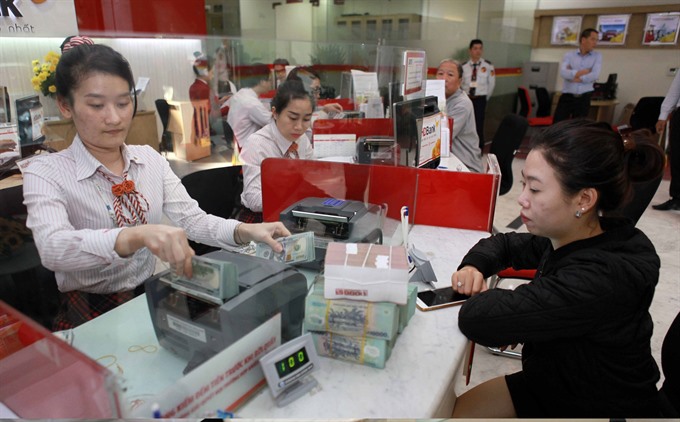State Bank of Viet Nam (SBV) continues to build up its foreign exchange reserves to cushion external shocks, raising the fund to more than US$57 billion till February 6.

State Bank of Viet Nam (SBV) continues to build up its foreign exchange reserves to cushion external shocks, raising the fund to a new record high of more than US$57 billion till February 6.
According to SBV Governor Le Minh Hung, SBV’s net purchase of hard currencies this year has been worth more than $4 billion.
SBV affirmed it would continuously try to increase the country’s foreign reserves this year, besides supporting efforts to stabilise the forex market.
Experts have so far been optimistic about the foreign exchange market in 2018, noting that the market would be stable, with the Vietnamese dong devaluing slightly by some 0.5-1 percentage points to VND22,710-VND22,950.
According to the Bank for Investment and Development of Viet Nam’s capital and monetary research division, the country’s overall balance of payment can maintain a healthy surplus of some $8-10 billion this year, which is important for the stability of the forex market.
The good balance of payment is expected due to a predicted trade surplus this year, while the remittance inflow is likely to inch by 5 per cent to some $10.5 billion.
Foreign direct and indirect investment capital inflows are also anticipated to maintain high growth, owing to improvement in the business environment of the country, the division said, forecasting the disbursement of capital source could reach $21-23 billion this year.
Last year, SBV also successfully made a net purchase of $13 billion, raising the forex fund to $53 billion, the highest ever.
Bloomberg reported last year that the Vietnamese dong was one of the most stable currencies in Asia in 2017.
Hung attributed the success to SBV’s insistence in monetary and foreign currency policies.
“The rising foreign reserves has contributed to strengthening Viet Nam’s prestige and creating confidence in investors investing in Viet Nam,” he said.
According to him, liquidity of the domestic foreign exchange market last year was good and met the legal demands of local organisations and individuals.
Thanks to the high foreign reserves, domestic commercial banks on February 8 continued devaluing the US dollar against the Vietnamese dong for the second consecutive session, despite a rise of the greenback in the global market.
The decline was seen in the context of the country’s abundant dollar supply source, while having no demand pressure.
State-owned Vietcombank on February 8 afternoon listed the dollar at VND22,650 and VND22,720 for buying and selling, respectively, down 10 dong against the previous day and VND25 from Monday.
BIDV also cut the buying and selling rate by 25 dong and 15 dong to quote the dollar at VND22,650 and VND22,730, respectively, while the decreasing rate at Vietinbank is 9 dong to VND22,652 for buying and VND22,722 for selling.
The same move was also seen at joint stock commercial banks, with a decrease of 15-25 dong per dollar.
ACB devalued the dollar by 20 dong against the previous day to VND22,650 for buying and VND22,720 for selling, while Techcombank listed it at VND22,650 and VND22,740 for buying and selling, respectively.
The State Bank of Viet Nam on February 8 also set the daily reference exchange rate at VND22,435 per dollar, down by 10 dong from the previous day.
With the current trade band of +/- 3 per cent, the ceiling rate applied to commercial banks during the day is VND23,108 and the floor rate is VND21,762.
In the global market, the dollar was supported after a budget deal in Washington, rising against a broad range of currencies. US congressional leaders reached a two-year budget deal on Wednesday to raise government spending by some $300 billion. The dollar index rose to a two-week high of 90.403 on Wednesday and last stood at 90.251. — VNS





